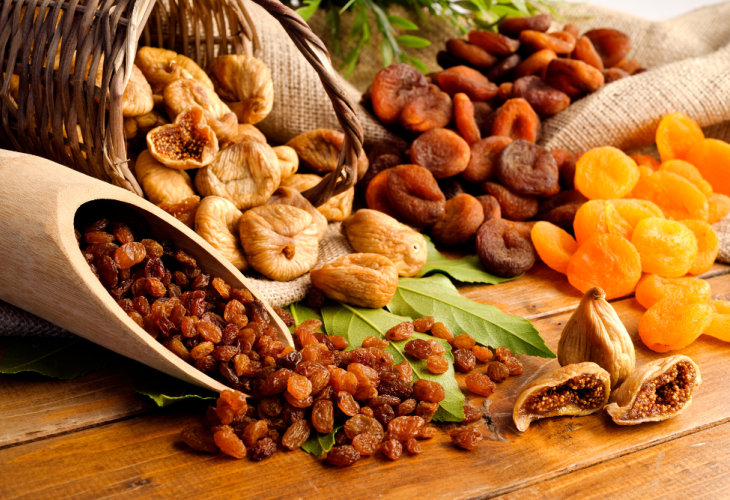Health and Nutrition
The Best and Worst Dried Fruits for Tu b'Shevat: What to Choose and What to Avoid
Nutritional benefits, hidden additives, and expert tips for a healthier holiday
 Illustration
IllustrationAs the holiday of Tu b'Shevat approaches, dried fruits fill the shelves in supermarkets and markets. Although fruits are generally considered healthy, some dried fruits contain additives and substances that are far from beneficial for the human body. What can sweeten your holiday, and what should you avoid? Here’s your guide.
Date (Tamar)
If you’re craving something sweet, dates are the healthiest choice.
They have a pleasant texture, rich flavor, and only 57 calories in one large Medjool date. They also offer an impressive nutritional profile: 10 different minerals, six B-vitamins, antioxidants, and dietary fiber.
Because dates naturally contain a high amount of fiber, their sugars are absorbed into the bloodstream more slowly and are therefore more filling than regular candy.
Health benefits of dates include:
Supporting the digestive system
Protecting blood vessels and heart health
Strengthening bones
Helping prevent high blood pressure
As for the drying process: dates dry naturally on the tree as part of their ripening process — with no added preservatives, coloring agents, or chemicals. This makes them a far healthier option than many other dried fruits.
Papaya
Dried papaya contains beta-carotene, which supports eye health and helps prevent certain cancers. It also provides potassium, which helps regulate and reduce blood pressure, and papain, an enzyme that breaks down proteins and aids digestion. Like all fruits, it also contains dietary fiber.
However, dried papaya is often heavily processed. It contains artificial coloring and sulfur dioxide, used to preserve its bright color. Although permitted in small amounts, some people may develop allergic reactions, and many unknowingly consume these additives from multiple sources.
Additionally, dried papaya is often soaked in large amounts of added sugar, making it very different nutritionally from fresh papaya.
Apricot
Dried apricots are rich in potassium and dietary fiber, and they also contain iron, a vital nutrient for maintaining healthy blood volume, preventing anemia, and supporting focus and alertness.
Many dried apricots contain sulfur dioxide (E220), which can cause asthmatic reactions in sensitive individuals. A healthier alternative is the brown dried apricots, which contain no sulfur — recognizable by their naturally darker color.
Whether brown or orange, dried apricots do not contain added sugar. Two to three pieces equal one serving of fruit.
Cranberries
Cranberries are known for their powerful antioxidants, especially anthocyanins (also found in strawberries, red cabbage, red wine, and other red fruits). These compounds help prevent:
Heart and vascular disease
Diabetes
Premature aging
Cognitive decline
Their color is completely natural and they typically contain no preservatives. However, most dried cranberries contain a very high amount of added sugar. Frozen cranberries contain only natural fruit sugar and no oil or preservatives.
Ginger
Fresh ginger is well-known as a natural remedy for sore throats and inflammation. As a dried fruit, it retains its spiciness and warming effect.
However, dried ginger often contains added sulfur and large amounts of sugar, so it is best to enjoy in moderation.
Kiwi
Dried kiwi offers very little nutritional value — minimal fiber, some potassium, and nothing more. Its color is artificial, and it typically contains large amounts of artificial dyes with sulfuric acid.
Producers also add large amounts of sugar, making dried kiwi one of the least recommended dried fruits.
Raisins
Raisins are rich in vitamins and minerals, dietary fiber, and antioxidants that help neutralize cellular damage. They support:
Heart and blood vessel health
Muscle and nerve function (due to magnesium and potassium)
Blood pressure regulation
Immune system strength (thanks to iron)
However, raisins contain a high concentration of natural sugars, and should therefore be eaten in moderation.

